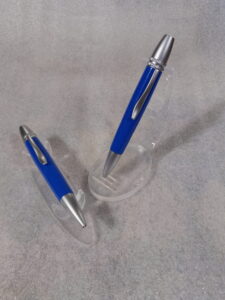
Photo credit: Eskay Lim – Unsplash
By Debbie Burke
Recently my computer spent a couple of days in the shop. No social media? No problem! But no internet and no email—that was difficult.
Unable to write or research, I cast around looking for a project to fill normal writing hours. My gaze fell upon the two-drawer filing cabinet crammed with writing stuff.
For years, I’ve invented delays to avoid going through those files: I’ll organize them as soon as I finish this book; as soon as I finish beta reading a colleague’s manuscript; as soon as I give that PowerPoint presentation; as soon as I meet this article deadline; and so on and so on…
Embarrassing confession: The last time I purged writing files was in 2003. Twenty years ago!
Lately, though, it had become increasingly difficult to stuff even one additional sheet of paper into the crammed Pendaflex dividers. Searching in the folders not only caused bleeding paper cuts but bruises on the back of my hand. The two drawers of the filing cabinet haven’t been able to close completely for quite a while.
With the computer in the shop, it was finally time. No more excuses.
I yanked out a stack of files and spread them across the dining table. The top drawer was supposed to contain current work that I need easy access to—ISBN numbers, income and expenses, marketing, recently published articles, WIPs, classes I teach, etc.
Also priority items in the top drawer are Merriam-Webster’s Pocket Dictionary, Strunk and White’s Elements of Style, and printouts of Jodie Renner’s editing tips.
Each book in my Tawny Lindholm Thriller series has its own folder of research, notes, beta feedback, etc. I’ve finished eight books—why are there only seven folders? Oh yeah, #8 is on the kitchen counter because it couldn’t fit in the drawer. Also on the counter are marketing to-do lists for #8.
Farther down in the pile were files from classes and conferences I attended. For 30+ years, I’ve been involved in planning our local Flathead River Writers Conference. Did I really need to keep notes of organizational meetings for all those years? Flight schedules of guest speakers I picked up from the airport? Menus and budgets? Nope. Into the trash.
But then I started reading the copious notes I took from the presentations.
And remembering.
That’s where this cleaning-out business gets tricky.
Pretty quickly I wandered down memory lane into a twisting rabbit warren of education and experience. Easy enough to discard handouts of social media tips from 2013 because that’s changed so much. But what about the 2016 Pikes Peak Writers Conference, a major turning point in my writing career?
For sure, I had to save my notes from Kevin J. Anderson, bestselling author of spin-offs for Star Trek, Dune, and X-Files. He gave a fabulous talk about world-building and illustrated the process with vivid sensory details about growing up in a little Wisconsin town that’s the sauerkraut capital of the world. His descriptions of smells are still imprinted in my memory. In a one-hour presentation, he literally revolutionized the way I work setting into my stories.
That triggered another recollection from later during the same conference. In a room packed with 100 attendees, there was a first-page read-aloud session. Kevin, along with another author and an agent, read the first page of my then-unpublished novel, Instrument of the Devil. Kevin heaped glowing praise on it.
THE Kevin J. Anderson, mega-million bestseller, was intrigued by my first page. I still remember sitting in a chair in the third row, overcome by feverish blushing that made me feel as if I were melting.
Also in that same folder was the certificate awarded at the banquet that night. IOTD won the best thriller/mystery category.
Gotta keep that and the warm memories from the conference that led to my first published book.
Next was a folder marked “TKZ.” It contained emails starting in 2015 between Kathryn Lilley and me where she invited me to guest post for the first time. More emails and more guest posts. Then, while we were at a vacation condo in Florida, I remember breathlessly reading Kathryn’s message out loud to my husband when she asked me to be a regular TKZ contributor.
Another major turning point in my career.
Gotta save those emails.
I time-traveled deeper into the past, uncovering drafts from 2007 of my tenth “practice” novel (the previous nine “practice” novels went out in the 2003 purge). Nice comments from my critique group but I barely remembered the mystery and tossed it without a twinge. Not compelling then and even less so today.
Found a stack of different-colored index cards from an even older mystery. The manuscript was gone so why did I keep the cards? Then the memory came back—I’d struggled with that timeline. A wise teacher suggested the index card system: write a single scene on each card then lay the cards out on the floor. Rearrange, add, or subtract scenes until the timeline makes sense. This was long before the invention of software that allows scene rearrangement onscreen. Wish I could remember who taught me the trick because I owe them thanks.
Buried even deeper in the pile were pages of 13-column ledger paper from the 1990s where I tracked submissions. Hundreds of them. To agents, editors, magazines, newspapers. One column recorded the dates of rejections. Early on, those outpaced acceptances tenfold. Later, acceptances increased, and rejections decreased.
Other columns logged dates of publication and payments, if any. Sometimes payments were simply copies of the magazine, if it survived long enough to publish. I personally take credit for putting at least 20 little literary magazines out of business in the ’90s.
Back in snail mail days, the process moved slowly. From the time of submission to the magazine hitting the stands could stretch six months, a year, or even longer. Payment was sometimes upon publication, other times after publication.
But gradually the acceptances increased. I found emails from editors who contacted me offering assignments that paid $25, then $100, then $400 plus mileage.
In the back of the drawer were three-ring binders full of published clips also dating back to the early 1990s. In those days, you saved “tear sheets”—actual pages of published articles torn from magazines or newspapers. When querying, you’d send them as samples of your work for the editor to judge.
By now, you’re wondering if I’ll ever get to the point of this post.
This is it.
Writing has never been a profession that delivers immediate gratification.
Measuring one’s writing progress is tough to quantify. In a regular job, a paycheck every week or two proves the worker’s worth and skills.
In writing, months and years may go by without a “paycheck.”
Even when your career reaches a point where you receive advances and royalties, the income probably won’t support you in the style you’d like to become accustomed to.
If you can’t measure your writing progress in a tangible monetary way, how do you know if you’re improving?
Your best yardstick is yourself.
Look back at what you wrote six months ago, a year, five years, or 20 years ago. Have your skills improved? Have you learned new craft techniques?
Did a class or workshop change the way you create characters, or handle action scenes, or infuse emotion into your stories? Has your pacing improved? Did you head-hop in the past but now you’ve finally mastered point of view (POV)?
Do readers and other writers notice improvement in your work?
Do you waste less time floundering around trying to find a story? Do you have more focus and better concentration when you write? Do you feel more confident about showing your writing to others?
Do you have goals? Have you achieved some of them? Then do you set higher goals?
Writing is a ladder without end. No one knows everything about writing. We all need to work continuously to improve our craft, master more complicated skills, and produce more words.
When I finished clearing old stuff from the file drawers, the discards in the wastebasket weighed about 50 pounds. I filled one banker’s box with conference highlights, published articles, old references I might someday need, and mementoes. That box went into storage in the spare bedroom.
The bottom drawer of the file cabinet now contains only the past three years of published articles and the first seven novels in my thriller series. Deep Fake Double Down, #8, is in the top drawer while I’m actively marketing and promoting. The top also contains daily business files and current to-do projects like uploading my books to Ingram Spark.
No more writing files on the kitchen counter. Whew.
Now the cabinet has plenty of room for new projects, including a nonfiction book proposal I’m working on. I can slip my hand between folders without tearing off layers of skin.
Cleaning out the files gave me the chance to reassess the progress of my writing career. I reviewed lessons learned during this never-ending apprenticeship.

photo credit: Vincent Van Zalinge, Unsplash
My goals back then were different. Did I achieve my dream of winning an Edgar for “Best First Novel”? Nope. A few friends earned six-figure advances for debut books. Did I? Nope. And that’s okay because, sadly, their careers went downhill after their initial one-hit wonders.
Today’s goals? Would I like to publish as many books as Nora Roberts? Sure. Make as many sales as James Patterson? Absolutely.

Photo credit: Aron Visuals, unsplash
Will I ever achieve those goals? Probably not. But I’ll keep plodding along like a tortoise, creating more words and stringing them together in better sentences and stories.
Those old files showed slow, steady progress through the decades.
That’s not glamorous or exciting but it is satisfying.
~~~
TKZers: How do you measure your writing progress?
What are your goals for the next year?
~~~
 For my new thriller, Deep Fake Double Down, Steve Hooley created a custom Deep Fake Sapphire collector’s pen. Visit my website to enter a free drawing for the pen and a signed book.
For my new thriller, Deep Fake Double Down, Steve Hooley created a custom Deep Fake Sapphire collector’s pen. Visit my website to enter a free drawing for the pen and a signed book.
Deep Fake Double Down is available from Amazon and other online booksellers.

Debbie, for me it’s always been the quota. Certain number of words every week, broken down by days, one day off to recharge. I’ve kept track of the words on Excel since 2000. That’s how I measure my goals.
As for getting better, I have one metric that doesn’t fail. It’s called Mrs B. She’s always my first reader, and I can tell from her reaction and notes how I’m doing.
Jim, Mrs. B is your secret weapon. You’re lucky to have her but you already knew that!
My measurement usually comes from my readers who say, “This is the best one you’ve written.” Some add, “Not that the others were bad…”
I thought by now writing would be easier.
“I thought by now writing would be easier.” LOL, Patricia!
The more we learn, the more we realize how little we know. Fortunatley, that keeps this job interesting.
Loved that comment from your readers! Sometimes the fact that it never gets easier can get me down, but then I remind myself, if it truly got easier, I wouldn’t be growing as a writer.
I, too, look at writing. Recently, our neighboring town had a “shred day” and I went through folders, boxes, drawers and ruthlessly put things into the bag(s) to go away and never been seen again. Realistically, those notes from craft workshops I took back in the day … I can present them myself now.
Notes from my books? I’ve written the books. They’re done.
A lot of this was probably due to having to clear my mom’s house after she died and we were trying to get it on the market ASAP, but she never threw anything away if she had a place to put it. I don’t need my kids dealing with things like my paperwork, since they’re going to toss it anyway. Might as well save them the trouble. (And I don’t need them thinking the things I was thinking about my mom!)
Terry, please come over and help me with a whole-house purge!
Yes, it’s gratifying to realize what we struggled to learn we now know well enough to teach.
Love this, Debbie! I’m in my obsession stage — last pass before publication where I nitpick every word, sentence, paragraph…fluctuating between “I suck” and “this is amazing” — and needed the gentle reminder to weigh the early years with where I am today. Thank you!
Sue, be kinder to yourself! You’ve accomplished a terrific body of work and your enthusiastic readers will never say you suck. 😉
Wow, Debbie, this post is deep and thought provoking, a good time to reassess what we are doing.
Thanks for sharing some of the things you’ve accomplished, your steady climb and progress, and benchmarks we can use to measure our progress.
“Writing has never been a profession that delivers immediate gratification.”
“Writing is a ladder without end. No one knows everything about writing. We all need to work continuously to improve our craft, master more complicated skills, and produce more words.”
Those are two quotes worth printing out and placing where we can see them while we write.
One thing I would add is assessing how many friends we’ve made along the journey. Debbie, you’ve achieved gold in that category.
I am honored to call you friend! Thanks for the inspiration.
9:07 EDT
I just got a call from Debbie that her internet is out, and she’ll comment on responses as soon as she’s done fighting with Spectrum and they have her internet fixed.
I’m betting on Debbie!
Aw, Steve, you make me blush. I feel the same way about you.
Yes, good friends we make along the way are a treasure, esp. during times of discouragement…like when my &%#$ internet keeps dropping!!!
It’s on temporarily but no guarantees. If it goes down again, I’ll answer comments later.
Fantastic post, Debbie! Congratulations on tackling such a big project. You’re so right about the value of taking the long view, and how learning never ends. Striving to constantly improve keeps us moving forward.
My latest release is a personal milestone in a couple of ways: first mystery, eighth novel published, tenth book published. It’s a lot more than I had ten years ago, which was a dozen or so short stories. My post here last Saturday on Thrillers was my 22nd (counting guests posts).
When the writing gets tough, when the publishing gets tougher, when sales are few and reviews fewer, it’s good to look back and see how far we’ve come.
I second Steve’s wonderful observation that we need to recognize all the friends we’ve made along the way, and I’ve been so blessed in that fashion, and am fortunate to call you friend as well.
Thanks, Dale, and back atcha!
Congratulations on your first published mystery! Shifting genres takes extra study and work. You did it and you’ve climbed another rung in this long ladder.
Glad to know I’m not the only one who saves files that really need to go into the trash. And it’s a good thing that most of my writing files are on my laptop, although, I’m sure there are many of those that need to be deleted.
Michelle, maybe we need an intervention from one of those reality TV shows about hoarders…I mean, archivists!
Please save the work on your laptop to thumb drives or external hard drives. I just learned the hard lesson that laptops don’t last forever.
I had a laptop give up the ghost last November. Thank goodness I’d backed up my work often. I have many redundant files because I don’t want to lose any of them, even if I’ll never need them again.
About 1967, I asked my mother for a file cabinet for Christmas. She bought me a 4-drawer, legal-size cabinet, probably under the presumption that the other option was illegal. I’ve never filled it entirely, possibly because, after 1985, so much work was stashed on various hard drives, some of which was lost due to drive failures. There are stacks of printouts here and there throughout the house. I did throw out all my MGA service records, however. Someday, I’ll really get organized. Maybe next week.
“the other option was illegal.” Good one, J!
Next week or the week after. The files will wait patiently until you’re ready.
Wonderful post, Debbie!
I can point to rungs on the ladder behind me and those above me. To me, that means I’ve made progress in this journey but there’s always another step above my head I need to get to. (Maybe I should start with that weirdly composed sentence …)
I also had the pleasure of cleaning out my mom’s house. And I don’t want my kiddos to be saddled with my stuff.
Where to start . . . where to start? 🙂
Thanks, Deb!
I think discarding stuff is hard b/c of the memories evokes. There’s a story behind each piece of paper.
“memories evoked” is what I meant. Typing too fast trying to beat the next internet connection failure.
I love this post, Debbie. (Aside from the fact that you’ve reminded me how many file cabinets I have with stuff accumulated over decades. But I’ll think about that later.)
“Writing is a ladder without end.” Sometimes we want to take the expressway to get to our destination, but that wouldn’t provide us with the rich journey through learning the craft of writing, attending writers conferences, making new friends, and forcing ourselves to go one step beyond where we thought we could go.
I’ve completed my fourth novel which will start the new Lady Pilot-in-Command series. (And thank you, Debbie, for beta reading and for your incisive feedback!) As I spend a few months shopping for an agent / publisher, I’ll be attending a couple of conferences and starting a middle grade series tentatively titled Reen and Joanie, Inc.
“Rich journey” – what a great description, Kay, and so true!
Best of luck in your agent/publisher quest! LPIC is a winning concept that should attract their attention.
Great post. After ruminating on it, I discovered that I tend to measure my writing like I measure vacations. Have I met someone new, been somewhere different, explored something special or found anything a bit off the beaten path? As I look back on my writing, I find a lot of familiar faces from many hours in different adventures. There are also a lot of places and concepts that I still have fond memories of visiting or exploring.
Then there are the faces, places and plots that passed by me in the night, hasty glances and unfinished conversations that did not quite click or otherwise find a home. Those are my characters that didn’t quite work, places and stories that never found their footing. For measuring progress, what’s awesome about them is that they are still there waiting, ready to engage when the time is right. More importantly, they’ll always be waiting, ready for whatever adventure may find me back with them.
In that regard, I can measure my writing more easily like a school yearbook, a growing collection of faces and places. It’s also a lot more exciting than a spreadsheet of royalties and sales.
Thanks for an inspiring post.
You’re so welcome, Stephen.
“School yearbook” is a great analogy. Some kids who were stars in school reached their pinnacle then and never moved forward after that. Others you thought would fall on their faces surprise you with their later accomplishments. Same with characters.
Wow. I enjoyed the story today and the visuals going on my head.
I have had similar writing piles over the years. The odd thing is, sometimes they become fluff pieces that aren’t meant to go anywhere. My parallel to doodling is to write little bits and pieces, and then I’d save it as a file or printout. Sometimes I did that when I was between meetings in the office. But lately, my old noodling has spouted new idea.
It’s strange, fun, and weird to go through the past in that way.
Hope you’re well and I hope your IT issues are working themselves out.
Ya just never know what doodling and noodling can lead to, Ben! Nothing is ever wasted b/c some of those idle thoughts eventually coalesce into a story.
One way I look at progress is comparing my increasing Grammarly word count against my sales numbers. As long as both are rising, or even holding their own, then I assume I must be doing something right. Enjoy your day, Debbie, and hopefully those computer bugs disappear.
What a great, simple way to measure progress, Garry!
The service guy just left. He replaced a splitter which improved the signal but agrees with me that the core problem is their system doesn’t have enough bandwidth to accommodate the increasing number of customers. A big upgrade in Montana is supposed to be in the works. Not holding my breath.
Didn’t you guys just ban TikTok?
The Guv did. Not sure how it will be enforced.
Oooh, this was so good, Debbie. First of all, congrats for getting through that job. A lot of people wouldn’t have ever made the time or spent the energy. It must have been a great feeling after you finished and could easily access all your (pertinent) files.
I was just thinking recently about how imaginary writing feels. When a plumber installs a new sink, he/she can see the immediate results: turn on tap, water comes out, job well done. But I often feel that I’m writing into the nether–particularly with the nonfiction work I do for clients. Those articles leave my computer and I rarely, if ever, see them again. (I could be better about tracking down links, but usually don’t bother.) At least I can see, smell, and hold my books in my hands.
Regarding writing goals, I use lists–lots and lots of them. Large goals broken down into small tasks helps me a lot. AND I love the kanban board method which I started using about 6 months ago for my fiction work.
This year, my goal is to publish my 11th Vermont-based suspense novel and get out and meet more readers in person. Online sales/social media is fine but there’s nothing like selling in-person to happy bookworms. It’s addictive!
Thanks so much, JP.
How right you are about a plumber being able to see the results of the work but it’s difficult for us b/c, as you say, we’re writing into the ether. I think that’s one of the toughest things for writers to get used to and make peace with.
I’m not familiar with the kanban board method. Will have to check into that.
“there’s nothing like selling in-person to happy bookworms. It’s addictive!” That personal connection is the best part for me, also.
Thanks for dropping by!